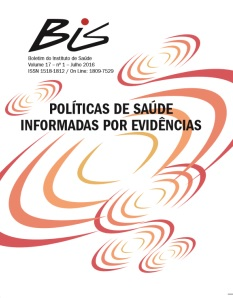Abstract
Mental disorders generate high social and economic costs, leading to decreased quality of life for those people affected by them. Although there are different therapeutically approaches to these diseases, in the last 10 years, there has been a significant increase in consumption and use of psychoactive drugs in the world. Technicians and managers of Franco da Rocha’s municipal Secretary of Health expressed concern about the medicalization of mental suffering in their municipality. A data survey was conducted, and the results confirmed the existence of high rates of prescribed antidepressants and inappropriate prescriptions of those drugs. A synthesis of scientific evidence of health policies was produced to propose options to reduce inappropriate and/or unnecessary prescription of antidepressants in Franco da Rocha. Evidence-Informed Policy Network (EVIPNet) methodology was used. From the reading of systematic reviews, four options were identified to respond to the problem posed. The evidence brief for health policy will be presented to professionals and managers of the Health Department of Franco da Rocha’s City by conducting a deliberative dialogue.
References
of Systematic Reviews. The Cochrane Library; 2015;(9).
2. Archer J, Bower P, Gilbody S, Lovell K, Richards D, Gask L, et al. Collaborative care for depression and anxiety problems. The Cochrane Library; 2012.
3. Bradley CP. Factors which influence the decision whether or not to prescribe: the dilemma facing general practitioners. British Journal of General
Practice;1992[acesso em 20 out 2015];454-458. Disponível em:http://www.ncbi.nlm.nih.gov/pmc/articles/PMC1372266/
pdf/brjgenprac00050-0008.pdf
4. Brennan N, Mattick K. A systematic review of educational interventions to change behaviour of prescribers in hospital settings, with a particular
emphasis on new prescribers. British Journal of Clinical Pharmacology; 2012[acesso em 20 out 2015];75(2):359-372. Disponível em:
http://onlinelibrary.wiley.com/doi/10.1111/j.1365-2125.2012.04397.x/pdf
5. Butler CA, Chapman JE, Forman EM, Beck AT. The empirical status of cognitive-behavioral therapy: a review of metaanalyses. Clinical Psychology
Review; 2006;(26):17-31.
6. Chhina H, Bhole VM, Goldsmith C, Hall W, Kaczorowski J, Lacaille D. Effectiveness of academic detailing to optimize medication prescribing
behaviour of family physicians. Journal of Pharmacy and Pharmaceutical Sciences;2013[acesso em 20 out 2015];16(4):511-529. Disponível
em: https://ejournals.library.ualberta.ca/index.php/JPPS/article/view/20414/15734.
7. Forsetlund L, Eike MC, Gjerberg E, Vist GE. Effect of interventions to reduce potentially inappropriate use of drugs in nursing homes: a systematic
review of randomised controlled trials. Norway: BMC Geriatrics; 2011[acesso em 21 out 2015];11-16. Disponível em: http://bmcgeriatr.
biomedcentral.com/articles/10.1186/1471-2318-11-16
8. Harkness EF, Bower PJ. On-site mental health workers delivering psychological therapy and psychosocial interventions to patients in primary care:
effects on the professional practice of primary care providers. The Cochrane Library; 2015(9).
9. Hyde J, Calnan M, Prior L, Lewis G, Kessler D, Sharp D. A qualitative study exploring how GPs decide to prescribe antidepressants. British Journal of
General Practice;2005[acesso em 21 out 2015];755-762. Disponível em: http://www.ncbi.nlm.nih.gov/pmc/articles/PMC1562347/
pdf/bjpg55-755.pdf10. Kaur S, Mitchell G, Vitetta L, Roberts MS. Interventions that can reduce inappropriate prescribing in the elderly: a
systematic review. Drugs Aging; 2009:26(12):1013-1028.
11. Lamb IGM. A prescrição de psicofármacos em uma região de saúde do Estado de São Paulo: análise e reflexão sobre uma prática [dissertação de
mestrado na internet]. Assis: Faculdade de Ciências e Letras de Assis da Universidade Estadual Paulista; 2008. [acesso em 20 out 2015]. Disponível
em: http://repositorio.unesp.br/bitstream/handle/11449/97588/lamb_igm_me_assis.pdf?sequence=1&isAllowed=y
12. Lavis JN, Oxman AD, Lewin S, Fretheim A. Ferramentas SUPPORT para a elaboração de políticas de saúde baseadas em evidências (STP). Health
Research Policy and System; 2009[acesso em 21 out 2015];7(Suppl 1:II):1-7. Disponível em: http://download.springer.com/static/pdf/883/
13. Mojtabai R, Olfson M. Proportion of antidepressants prescribed without a psychiatric diagnosis is growing. Health Affairs; 2011[acesso em 21 out
2015].;30(8): 1434-1442. Disponível em: http://content.healthaffairs.org/content/30/8/1434.long
14. Nishtala PS, McLachlan AJ, Bell SJ, Chen TF. Psychotropic prescribing in long-term care facilities: impact of medication reviews and educational
interventions. The American Journal of Geriatric Psychiatry; 2008;16(8):621-632.
15. Organização Mundial da Saúde. Guia para a boa prescrição médica. Bucweitz C, tradutor. São Paulo: Artmed;1998.
16. Reeve E, Shakib S, Hendrix I, Roberts MS, Wiese MD. Review of deprescribing processes and development of an evidence-based, patient-centred
deprescribing process. British Journal of Clinical Pharmacology; 2014 [acesso em 20 out 2015];78(4):738-747. Disponível em: http://
www.ncbi.nlm.nih.gov/pmc/articles/PMC4239968/pdf/bcp0078-0738.pdf
17. Santos EG, Siqueira MM. Prevalência dos transtornos mentais na população adulta brasileira: uma revisão sistemática de 1997 a 2009. Revista
Brasileira de Psiquiatra; 2010;59(3):238-246.
18. Tentler A, Silberman J, Paterniti DA, Kravitz RL, Epstein RM. Factors affecting physicians’ responses to patients’ requests for antidepressants: focus
group study. Journal of General Internal Medicine; 2008 [acesso em 20 out 2015];23(1):51-57. Disponível em: http://www.ncbi.nlm.
nih.gov/pmc/articles/PMC2173928/pdf/11606_2007_Article_441.pdf.

This work is licensed under a Creative Commons Attribution 4.0 International License.
Copyright (c) 2016 Aline A. V. Ribeiro, Cristina M. S. Gomes, Raquel J. Lima, Ricardo A. Botelho, Ligia Rivero Pupo, Maria L. Salum e Morais
